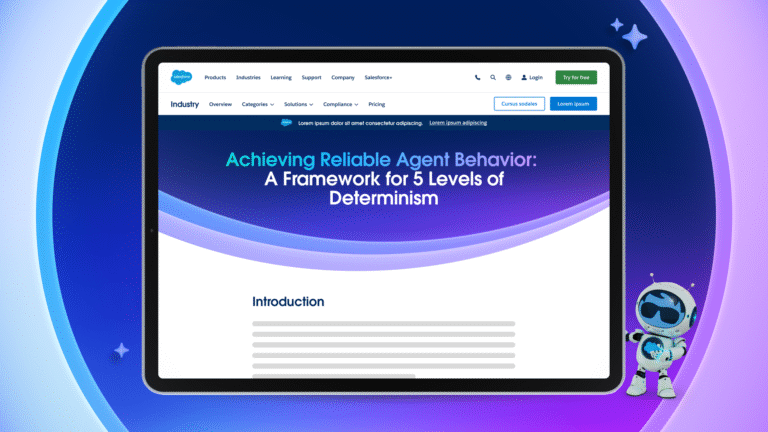Breakthroughs in new-age technologies and changing expectations of digital-savvy customers are the main contributors to the ongoing revolutionary change in the financial services industry. Be it banks, asset and wealth management firms, or insurance companies, the financial industry has recognized enhanced customer experience as the differentiators to outperform in this competitive market. It is in this dynamic environment that the revolution of the customer experience with the help of Salesforce is happening right now. Salesforce aids in transforming financial firms by allowing them to put forth personalized yet streamlined services efficiently through its platform for financial services. In this blog post, we’ll understand how Salesforce for financial services is altering the customer experience in the financial sector.
Significance of Customer Experience in Financial Services
In the financial services industry, Customer experience has become an important differentiator. Hence, banks and other financial institutions need to consider customer satisfaction as their core principle. A good customer experience results in greater satisfaction, improved loyalty, and increased rates of retention. On the contrary, bad experiences lead people away from a brand and result in a damaged reputation.
Salesforce for financial services equips customers with a range of tools built to boost multiple touchpoints of the customer journey. You can tailor interactions and streamline your business processes, empowering your financial institution to not only meet but exceed the expectations of customers.
Important Features of Salesforce for Financial Services
Salesforce for the finance industry provides multiple features that are customized to meet the requirements of the sector. The features help enhance customer interactions, improve the efficiency of operations, and promote business growth. Here are some important features of Salesforce for financial services you need to consider:
Financial Services Cloud
The Financial Services Cloud is the center of Salesforce’s offerings for the finance sector. From various input sources, it combines customer data into a single platform to enable a 360-degree view of customers. With this complete view, financial advisors and service agents can provide personalized recommendations and hence form stronger bonds with their clients.
Don’t forget to check out: How can Salesforce Experience Cloud be Leveraged to Establish a Seamless Customer Experience?
Omni-Channel Engagement
Today’s digital age brings an expectation among customers for seamless interaction across various platforms. In the finance sector, a company such as Salesforce uses its wide range of communication methods or omni-channel capabilities so that every customer may be reached by their preferred channel whether this is email, phone call, SMS text messages, Facebook message/WhatsApp chat among others. This makes way for a connected and consistent experience that results in improved customer satisfaction.
Einstein Analytics
Einstein Analytics makes use of machine learning and AI to offer actionable insights to users. With the help of these insights, a company dealing with finances can foresee the future demands of its clients as well as see the chances of persuading them into buying more or purchasing related products/services than they initially intended. Salesforce for financial services leverages AI-based apps/tools to ensure data-powered decision-making.
Security and Compliance
The finance industry is under the regulation of stringent laws and policies it must comply with to maintain the highest standards across board. Salesforce for financial services with its strong regulatory and security aspects assures protection of clients’ details as well as meets regulations, thereby building customer confidence and minimizing expensive fines.
Advantages of Using Salesforce for Financial Services
When you implement Salesforce for your financial institution, you introduce various advantages into your organization. These advantages offer quality customer experience, improve the efficiency of operations, and boost the overall performance of a business. Here are the key advantages you need to consider:
Personalized Customer Experiences
By having a holistic picture of customer data, financial organizations build the capacity to provide personal experiences. Based on personal preferences, financial goals as well as previous engagements, advisors can give tailored suggestions. Consequently, through this kind of customization it gets easier for customers to have faith in financial companies which leads to building loyalty and trust.
Enhanced Operational Efficiency
Salesforce for financial services automates everyday duties and refines procedures so that staff members are free to concentrate on revenue-generation activities. This lowers the total cost of ownership while increasing the overall value generated by the business. In turn, this leads to higher efficiency rates through less manual errors. Thus, banks are able to serve clients better, targeting their most profitable segments as well as reallocating capital across different projects according to their risk profiles and expected returns.
Data-Based Insights
Einstein Analytics gives us profound knowledge into customer behavior and market trends. This information can help financial services companies to make more educated decisions, spot chances for expansion as well as manage the associated risks. When businesses anticipate changes in their industries early enough, they maintain their competitive edge and agility.
Flexibility and Scalability
Salesforce for financial services is easily scalable and can be adapted to suit any changes that may occur within the financial sector. An organization, regardless of whether it is a small credit union or a giant multinational bank, can adjust Salesforce to meet its needs This adaptability ensures that firms in this sector can expand and develop new products without being limited by technology.
Better Collaboration
The collaborative tools of Salesforce encourage natural and smooth communication within multiple sections of the organization. This enables people in client advisory services, service representation business, and back-office staff to become more efficient, ensuring that they take similar actions on each customer issue they are handling. This teamwork enables better output and quality support.
![]() Check out another amazing blog here by Alok: Leveraging Salesforce and Tableau Integration for Better Visualization
Check out another amazing blog here by Alok: Leveraging Salesforce and Tableau Integration for Better Visualization
Conclusion
Salesforce seeks to overhaul the customer experience for financial services by ensuring it has designed the most comprehensive and integrated platform that is capable of addressing the very unique challenges and opportunities present in the sector. Through the Financial Services Cloud and other products such as Einstein Analytics, omni-channel engagement techniques as well as ensuring compliance with all relevant regulations, Salesforce for Financial Services can help financial institutions offer efficient, secure, and personalized experiences.
Salesforce implementation in financial services offers a variety of benefits such as enhanced customer personalization, improved operational efficiency, seamless collaboration, and scalability. The transformative impact of Salesforce on customer experience has been exemplified through its real-world applications in wealth management, retail banking, insurance, and mortgage lending.
Salesforce will continue to drive innovation as the finance industry evolves with the aim of assisting financial organizations in forging lasting relationships with their clientele. By incorporating Salesforce for Financial Services, firms can become customer-focused and stand out among their peers in terms of competitiveness and adaptability in the evolving business landscape.











